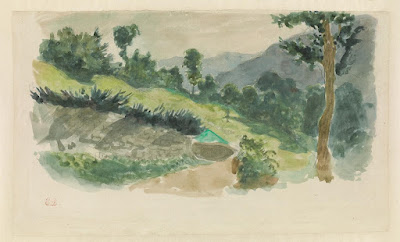 |
| George Richmond The Fatal Bellman 1827 engraving Minneapolis Institute of Art |
 |
| Richard Parkes Bonington Doge's Palace, Venice 1826 oil on board Cleveland Museum of Art, Ohio |
 |
| Jean-Auguste-Dominique Ingres Small Bather 1826 oil on canvas Phillips Collection, Washington DC |
 |
| Jonas Welch Holman Man with a Pen ca. 1827 oil on panel Art Institute of Chicago |
 |
| Isaac Cruikshank Cricket Grounds at Darnall, Sheffield, Yorkshire ca. 1827 drawing (print study) British Museum |
 |
| Peter De Wint Study for The Ferry after 1829 watercolor Metropolitan Museum of Art, New York |
 |
| Robert Walter Weir The Poet's Dream ca. 1830 watercolor Detroit Institute of Arts |
 |
| Joseph Anton Koch Hylas seized by the Nymphs 1832 oil on canvas Städel Museum, Frankfurt |
 |
| Eugène Delacroix Blacksmith 1833 etching and aquatint Milwaukee Art Museum |
 |
| Christen Købke Académie 1839 drawing Minneapolis Institute of Art |
 |
| Robert or Mary Smirke Wooded Scene with Couple lying under a Tree (illustration to Shakespeare) before 1845 watercolor and gouache Yale Center for British Art |
 |
| Eugène Delacroix Path on the Side of a Mountain, Eaux-Bonnes, Pyrénées 1845 watercolor (formerly owned by Edgar Degas) Yale University Art Gallery |
 |
| Ary Scheffer Christ the Comforter ca. 1847 oil on canvas Centraal Museum, Utrecht |
 |
| Rembrandt Peale Pearl of Grief 1848 oil on canvas Milwaukee Art Museum |
 |
| Alfred Rethel Death as a Friend (series, Dance of Death) 1850 woodcut Cleveland Museum of Art, Ohio |
 |
| Paul Gavarni Parisian Couple in Carnival Dress Relieving Themselves ca. 1850 gouache on paper Princeton University Art Museum |
What god, o Muses, fended off such fierce
fires from the Teucrians? Who saved their ships
from such a blazing conflagration? Tell me.
For that which makes us trust the tale is old,
and yet the story's fame is everlasting.
When he prepared to seek high seas, Aeneas
first built his fleet in Phrygian Ida; then
the Berecynthian herself, the mother
of gods, is said to have addressed these words
to mighty Jove: "My son, now you have won
Olympus, listen to my prayer, grant
what your dear mother asks. I had a forest
of pine, which I had loved for many years,
upon my mountain's summit, where men brought
their offerings to me; here, shadowed, stood
a grove of black pitch trees and trunks of maples.
I gave these gladly to the Dardan chief
when he had need to build a fleet. But anxious
fear now torments my troubled breast. Free me
of dread and answer this, a mother's prayer:
that in their journeying no wave or whirlwind
may ever tear these timbers; let it be
a help to them that they grew on my mountain."
Her son, who turns the constellations, answered:
"Why, Mother, have you called upon the Fates?
What are you asking for your favorites?
That hulls made by the hands of mortals should
have the immortals' privilege? And that
Aeneas may pass, sure, through unsure dangers?
What god commands that power? Nonetheless,
when they have fulfilled their tasks and reached their end
of journeying, the harbors of Ausonia,
then all that have escaped the waves and carried
the Dardan leader to Laurentum's lands
are saved: I shall strip off their mortal form;
I shall command those galleys to take on
the shapes of goddesses of the great waters,
even as are the Nereids, Galatea
and Doto, whose breasts cut the foaming sea."
He spoke and by his Stygian brother's waters,
by riverbanks that seethe with pitch, a black
and whirling vortex, nodded his assent,
and with his nod made all Olympus shudder.
– why Turnus proves unable to burn the Trojan ships, from Book IX of Virgil's Aeneid, translated by Allen Mandelbaum (1971)